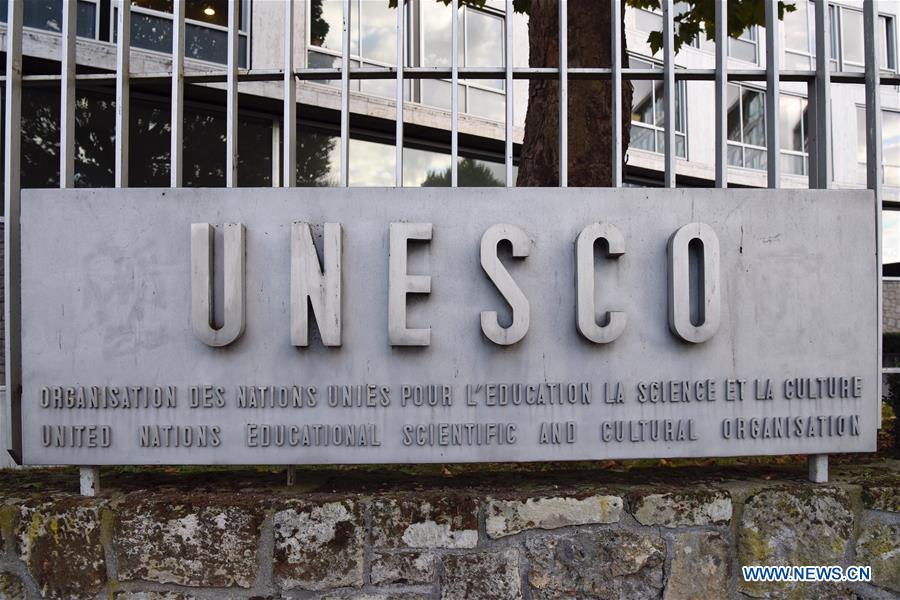


Photo taken on Oct. 12, 2017 shows the United Nations Educational, Scientific and Cultural Organization (UNESCO) headquarters in Paris, France. The United States on Thursday informed the UNESCO that it would formally withdraw from the organization on Dec. 31, 2018. (Xinhua/Chen Yichen)
After years of fruitless negotiation, U.S. on Thursday announced its official withdrawal from UNESCO, denouncing the organization’s “anti-Israel bias.” The abrupt yet expected decision has been showered with criticism, with many experts calling the move America’s “latest anti-multilateralism strike.”
The withdrawal follows long-standing disagreement the U.S. has had with UNESCO on the organization’s structural and financial reforms, as well as its attitudes toward the Israeli-Palestinian conflicts. Though the U.S. will lose its right to vote on issues after the withdrawal, it hopes to remain involved as a nonmember observer, adding that the decision which goes into effect at the end of 2018 could be revisited if UNESCO returns “to a place where they’re truly promoting culture and education on all of that," according to Heather Nauert, a spokeswoman for the State Department.
In response to the U.S. withdrawal, Irina Bokoba, UNESCO’s director general, expressed regret in a written statement on Thursday, noting that it’s a “loss for multilateralism.”

“The primary cause of the withdrawal lies in America’s discontent over UNESCO’s multilateralism. The U.S. cannot impose its will on the organization due to the lack of veto power. Since the U.S. doesn’t trust that multilateralism can make the world a better place, its reluctance to join UNESCO is understandable,” Ren Woxing (pseudonym), a journalist who stationed in UNESCO, told Xiakedao, a public WeChat account operated by the People’s Daily Overseas Edition.
The disagreement between the U.S. and UNESCO has also cast a shadow on the organization’s future development. For the past six years, it has hardly hired any regular staff due to financial shortage, while many experts believe that the withdrawal may affect the organization’s ongoing election of the new director-general.
“The timing of the withdrawal is important, as the result of the election will come out soon. The U.S. has already expressed a strong distaste for the candidates, especially when four out of eight of them are Arabs,” said Ren.
It is the first time that the UNESCO elections witnessed four Arab candidates, while the former Egyptian Planning Minister Moushira Khattab is believed to be a competitive candidate due to the support he gained from both Arabic and African countries.

“Both Obama and Trump do not believe in multilateralism. They want to ensure Hollywood’s advantage in cultural exportation, an attempt that is against the Convention on the Protection and Promotion of the Diversity of Cultural Expressions, which calls for the protection of indigenous and weaker cultures. This is the fundamental and structural contradiction between the two sides,” said Ren.
The U.S. government's unpaid dues have also dampened the country's relationship with UNESCO. Being the organization's largest financial contributor, the U.S. stopped funding it in 2011, cutting off 22 percent of its budget.
Amid the U.S. withdrawal, many experts have discussed China’s role in the organization’s future development, as the country is the third largest financial contributor to UNESCO after the U.S and Japan. In addition, China has been sharing UNESCO’s multilateralism ideas, with Chinese President Xi Jinping calling for encouraging different civilizations to respect each other and live in harmony during his visit to UNESCO in 2014.
“China respects international organizations and is in favor of international cooperation. After the U.S. withdraws, China will become the second largest financial contributor to the organization, and will take more responsibility and deepen cooperation with UNESCO,” said Ren.
 Fire brigade in Shanghai holds group wedding
Fire brigade in Shanghai holds group wedding Tourists enjoy ice sculptures in Datan Town, north China
Tourists enjoy ice sculptures in Datan Town, north China Sunset scenery of Dayan Pagoda in Xi'an
Sunset scenery of Dayan Pagoda in Xi'an Tourists have fun at scenic spot in Nanlong Town, NW China
Tourists have fun at scenic spot in Nanlong Town, NW China Harbin attracts tourists by making best use of ice in winter
Harbin attracts tourists by making best use of ice in winter In pics: FIS Alpine Ski Women's World Cup Slalom
In pics: FIS Alpine Ski Women's World Cup Slalom Black-necked cranes rest at reservoir in Lhunzhub County, Lhasa
Black-necked cranes rest at reservoir in Lhunzhub County, Lhasa China's FAST telescope will be available to foreign scientists in April
China's FAST telescope will be available to foreign scientists in April "She power" plays indispensable role in poverty alleviation
"She power" plays indispensable role in poverty alleviation Top 10 world news events of People's Daily in 2020
Top 10 world news events of People's Daily in 2020 Top 10 China news events of People's Daily in 2020
Top 10 China news events of People's Daily in 2020 Top 10 media buzzwords of 2020
Top 10 media buzzwords of 2020 Year-ender:10 major tourism stories of 2020
Year-ender:10 major tourism stories of 2020 No interference in Venezuelan issues
No interference in Venezuelan issues
 Biz prepares for trade spat
Biz prepares for trade spat
 Broadcasting Continent
Broadcasting Continent Australia wins Chinese CEOs as US loses
Australia wins Chinese CEOs as US loses